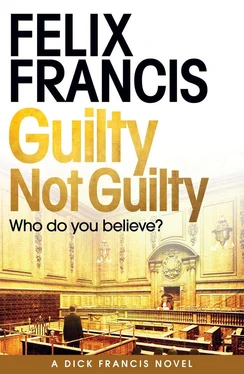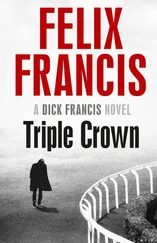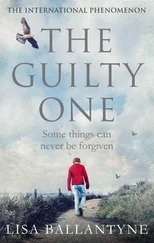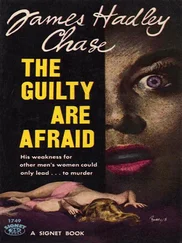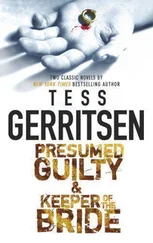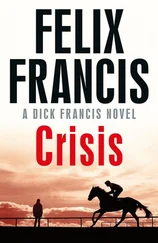‘So do I,’ said the DS. ‘He already knows I was there.’
‘How?’
‘He called his mother while I was talking to her.’
Bloody hell.
‘Did she tell him why you were there?’
‘She said that I was asking questions about the knife incident.’
‘What did he say?’ I asked.
‘I couldn’t hear him, only her, but it was after the call that she decided she couldn’t remember which of you had been holding the knife.’
Unbelievable.
‘He also told her to ask me why you weren’t still in custody.’
‘I hope you didn’t tell her that I was no longer a suspect.’
There was a deafening silence from the other end of the line.
Oh, my God.
I walked round the house, checking that all the doors and windows were locked.
Was I frightened of Joe Bradbury and what he might do?
You bet I was.
The most certain way of getting away with murder was to ensure that someone else was convicted of the crime and now, for him, the chances of that happening had greatly diminished.
I went into the kitchen.
I still hadn’t replaced the lock on the back door, nor the splintered wood surrounding it. Something about leaving it hanging there, twisted and broken, was important to me, perhaps as a reminder of what had occurred. Not that I really needed reminding — the appalling absence in my bed at night was more than enough for that.
But the broken lock also stood as a sign that matters remained unresolved and they would continue to be so until Joe was finally brought to book.
I had removed the police padlock and clasp from the outside of the door but had installed new bolts, top and bottom, on the inside. I now checked that they were fully slid over.
I also checked the French windows in the dining room and the door out into the garden from the conservatory. They still had the padlocks and clasps in place on the outside and both were secure, the snap-shut shackles clearly visible through the glass.
The front door was also locked but all of that hardly made the house totally impenetrable from the most determined would-be intruder. The ground-floor windows were comfortably accessible from outside and the glass in them could easily be smashed. For the first time ever, I wished I was living once more in a thirteenth-century castle with four-feet-thick fortified walls and high-up windows.
I wondered about going back to stay with my parents, but I felt I needed to be here, close to the action as it were, ready to assist the police as necessary.
I did another circuit of the ground floor to check everything was still in place and then propped the back of a chair under the handle on the inside of the front door, just in case someone tried to break the whole thing down.
‘Pull yourself together,’ I said out loud to myself. ‘He’s hardly likely to come here to try anything. It would simply prove his guilt.’
But I wasn’t at all sure that Joe could think that rationally. In all his dealings with Amelia and with me in recent years, he had shown himself to be conspicuously short of logic and reason, and I had no grounds to imagine he would have suddenly changed now.
Not to mention the carving knife incident at his mother’s house, which was still very fresh in my memory.
I would have felt so much safer if he was in one of the cells at Banbury Police Station, savouring the delights of a thin blue plastic-covered mattress, a musty blanket, lumpy pillow and one main meal a day.
Once I was happy that the Old Forge was as fortress-like as I could make it, I took a cup of coffee into my study, sat down at the desk, and took stock.
I had always felt huge sympathy for those people whose husband, wife or child had been murdered and that singular dreadful event had then defined their lives for ever more. For some, it was compounded by the killer never being identified or, worse still, the body never being found.
Suzy Lamplugh had been twenty-five years old when she disappeared in July 1986 from outside a house in Fulham. Numerous police searches spanning more than thirty years, including the dismantling of a whole building in October 2018, have failed to find a single trace of her.
Eight years after her disappearance, she was officially declared dead, probably murdered, but no evidence has ever been obtained to directly link any suspect to the crime.
Suzy’s parents devoted the rest of their lives to keeping the search for her alive in the minds of both the police and the public but, nevertheless, they both went to their graves not knowing what had befallen their beautiful daughter, or where her remains now lie.
There have been others, too, for whom not knowing who killed their loved ones has resulted in a life of misery and despair. It has torn families apart, driven formerly quite perceptive and cogent individuals into gibbering wrecks, and laced them with an intensity of anger, with no target against which it could be vented.
In short, the murder had destroyed them as human beings as much as it had the victim.
Murder is a very special crime, uniquely evil.
Robbery, theft, fraud, and online hacking of old ladies’ bank accounts are all despicable acts for which the perpetrator should be rightly punished and the funds recovered, but murder crosses a totally different line altogether.
By murder, you take away something that can never be given back.
I drank the rest of my coffee and resolved not to join the list of murder-family casualties. Not that I didn’t miss Amelia terribly. I did. But she would not have wanted my life to stop with hers, whatever the circumstances. And I at least knew where her body lay, even if I hadn’t actually seen it, and I also knew who was responsible. All I had to do now was help prove it.
By mid-afternoon, my security frenzy had subsided somewhat with me only doing a round of the house every half-hour rather than the every five minutes of this morning.
And I was hungry.
It was a Wednesday.
In order to keep life moving on in some semblance of normality, I decided that a trip to Waitrose in Banbury was called for.
I went into the kitchen and made a list of essentials such as bread, coffee, milk, butter and eggs. I decided I would also buy a large supply of individual frozen ready meals to pop in the microwave whenever I needed one. It was so much easier for someone else to have done the cooking.
Not that I couldn’t cook if required to, and I had been known to often, even when we’d had guests, but the kitchen had mostly been Amelia’s domain, and I had no desire to cook for just myself anyway.
With my list complete, I now had the problem of leaving my fortress and venturing out into the big bad world, albeit only as far as Amelia’s Fiat 500 parked on the driveway.
I again went round the house looking out of every window, searching for anyone lurking in the bushes. I even went upstairs and hung out of those windows to see if anyone was standing up close to the house waiting to lunge at me with a knife as I left.
There was no one.
However, my heart was still pumping rather faster than usual as I grabbed the keys, removed the chair from the front door, opened it, stepped out, slammed it shut again and ran to the car.
There was no shout, no call, and no one pounced from hiding to try and do me injury.
As I locked the car doors from the inside, I laughed at myself, but it was only the sort of laughter that comes from the sudden relaxation of stress.
I backed out onto the road and looked both ways, searching for Joe’s black Nissan, but there was nothing, just a courier’s white van delivering to another house down the road. Not to me , I thought. I’ve ordered nothing.
Читать дальше
